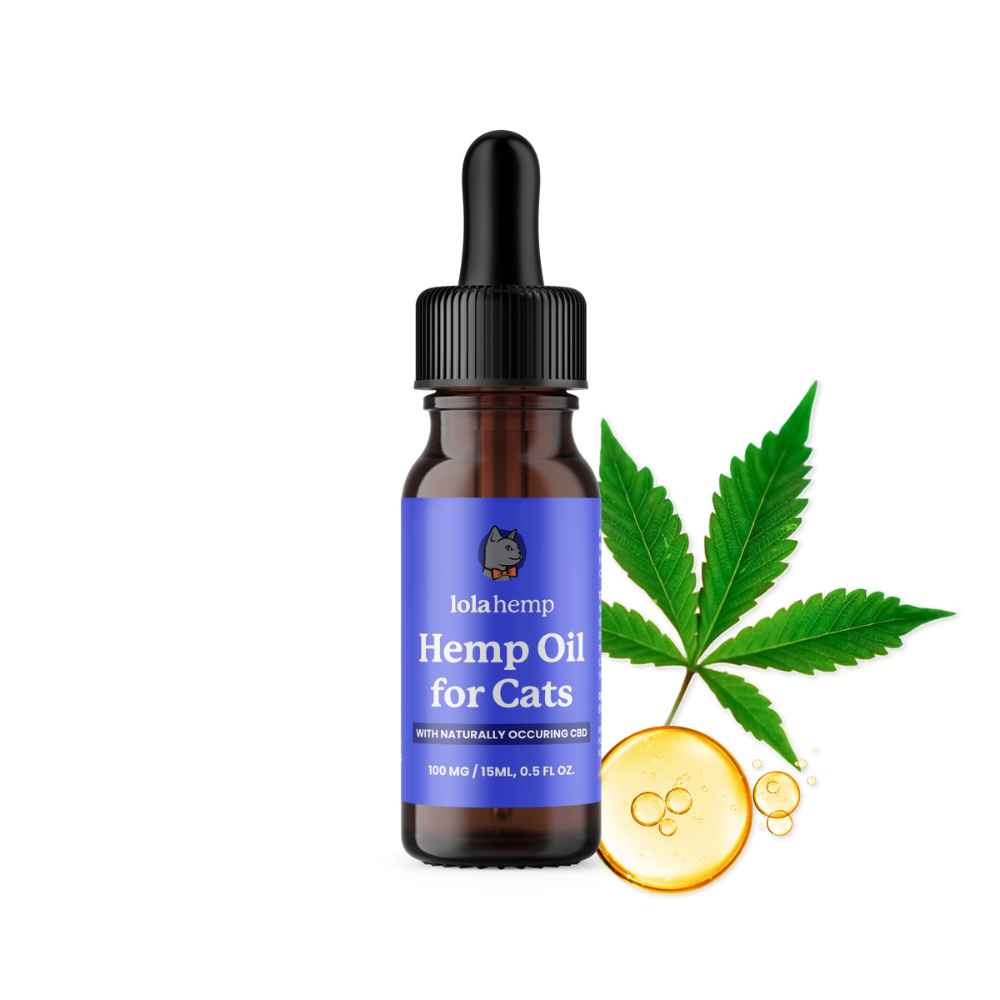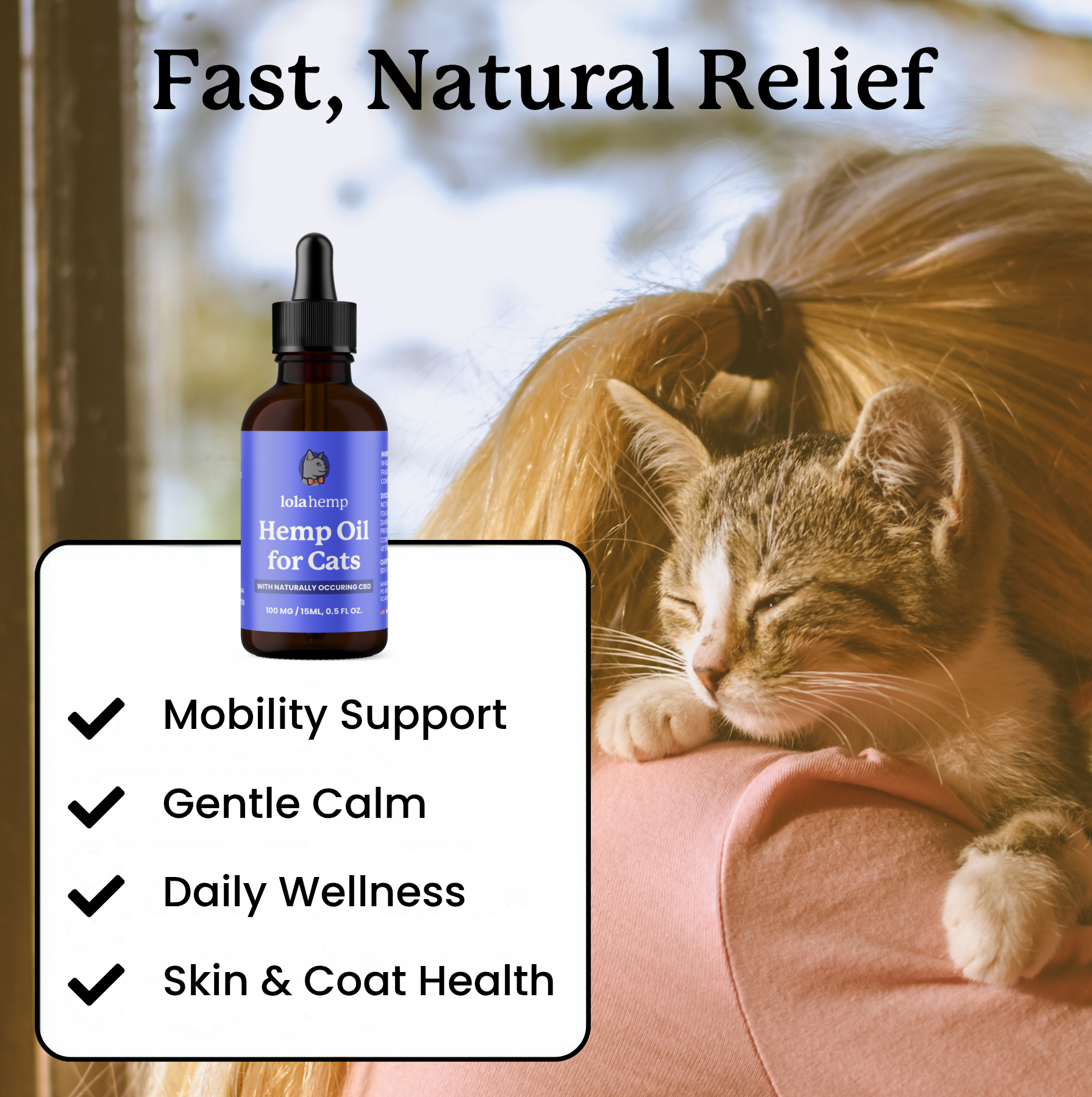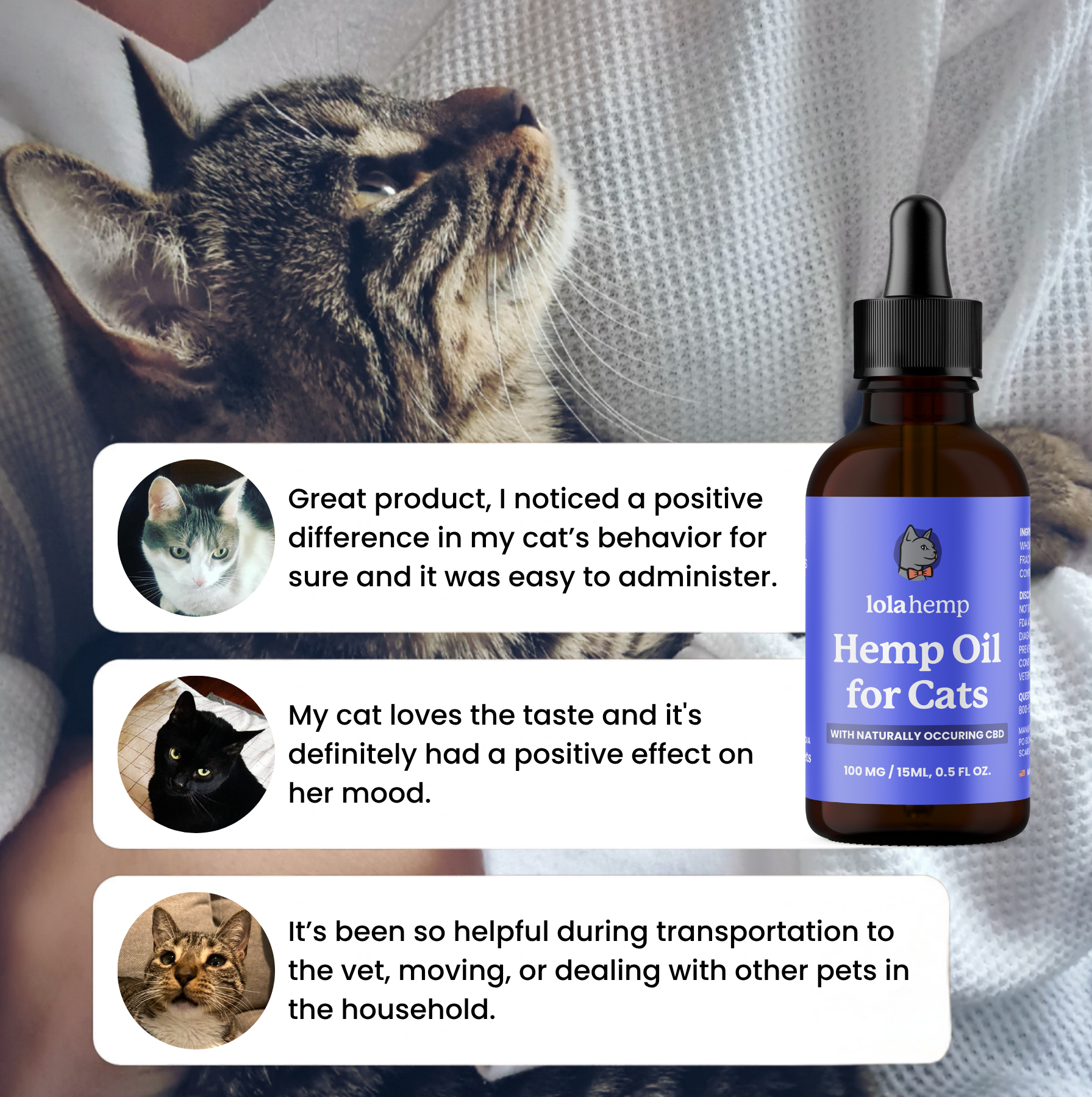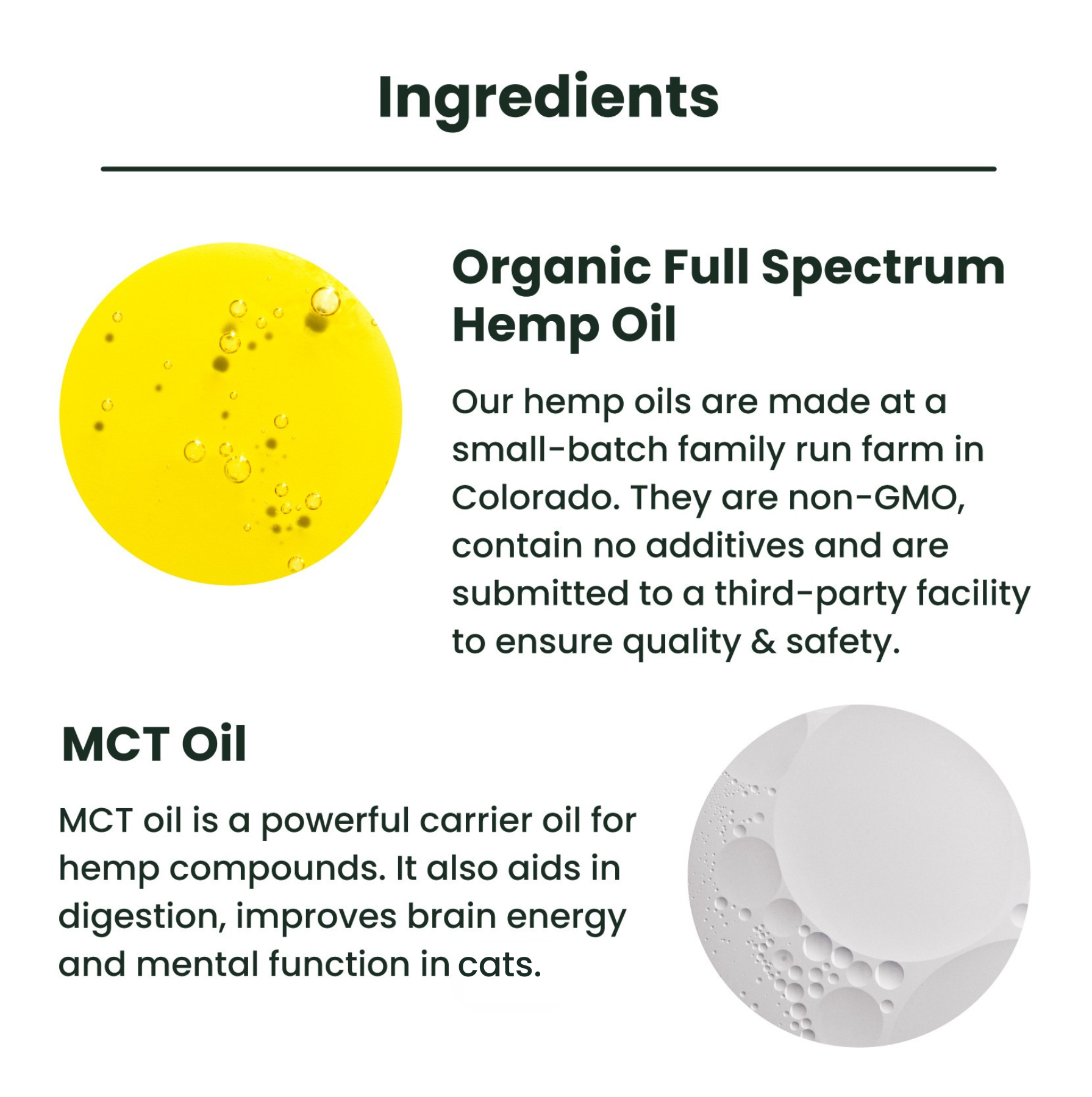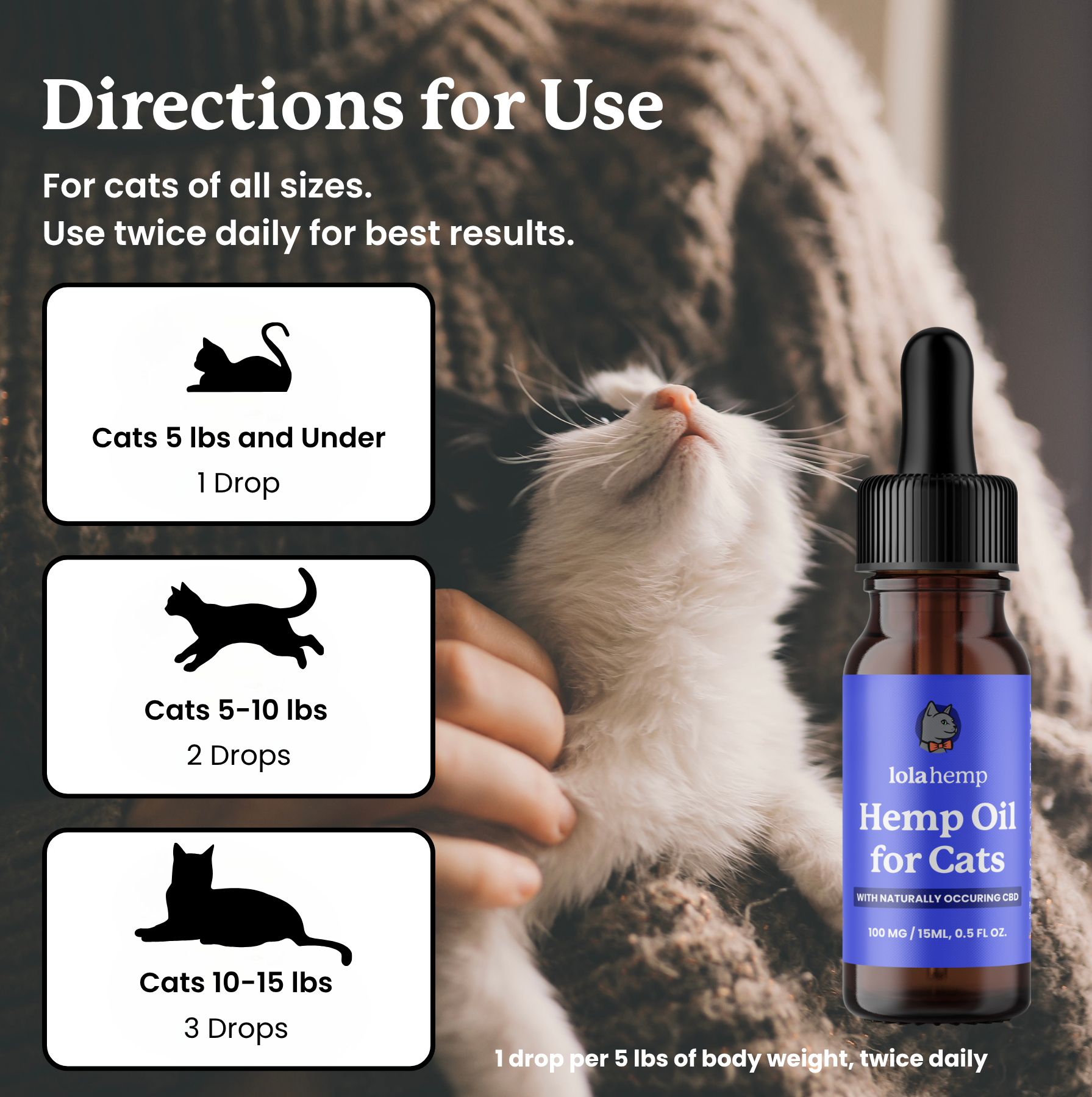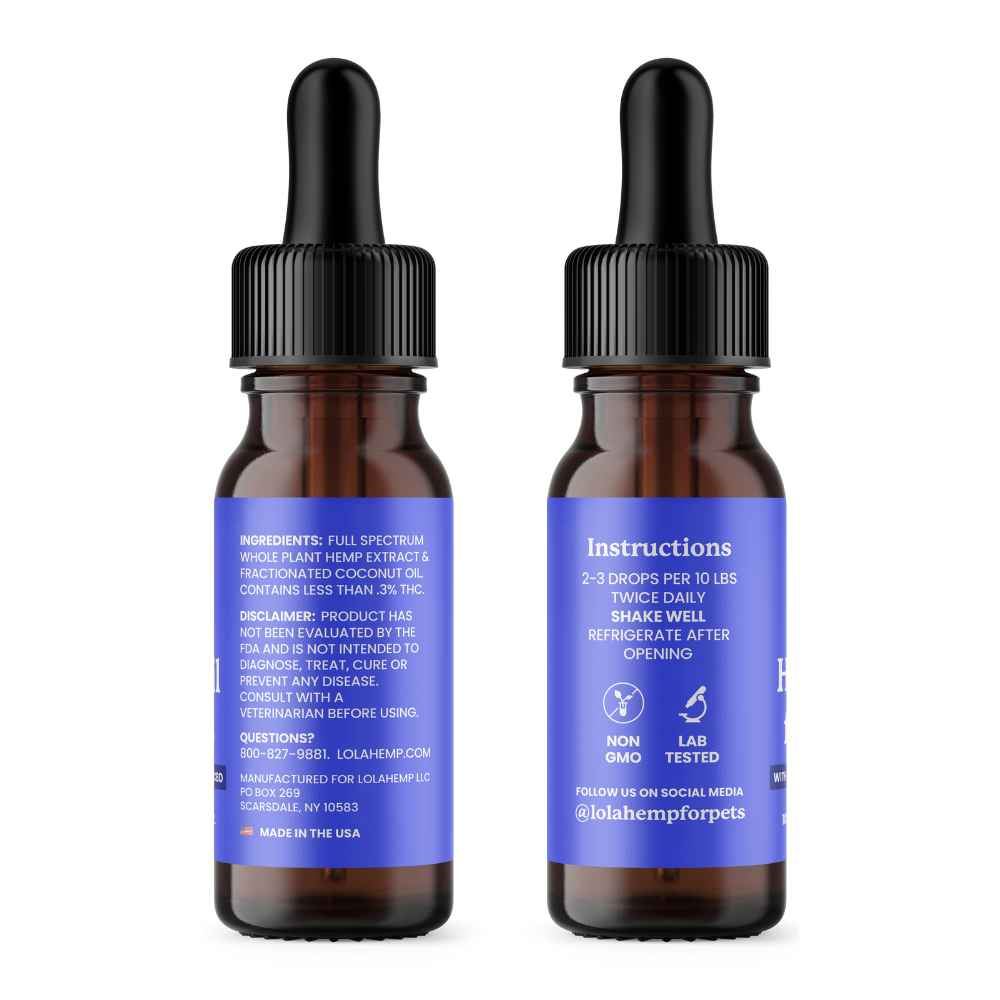There are a lot of important to questions to ask if you're a cat owner considering natural wellness options. For example, is hemp oil good for cats? Are other essential oils safe for me to use in an effort to help my feline friend?
It's important, and it can be overwhelming. The article below covers most of the information that cat owners commonly ask about using essential oils around their cats.
Note that essential oils aren't always safe for cats, and they can be dangerous. Our suggestion is to steer clear of most essential oils if you have cats in your home, and opt for safer options like hemp and CBD oil. That said, there are options for you to consider safely.
Let's take a look.

- What are Essential Oils?
- Using Essential Oils Around Cats
- Are Calming Essential Oils Safe for Cats?
- Calming Oils You Can Use for Cats
- Benefits of Using Some Essential Oils for Cats
- Can Essential Oils Be Toxic to Your Cat?
- What to do If Your Cat Reacts to Essential Oils
- Conclusion
- Frequently Asked Questions About Essential Oils for Cats
- 1. Are essential oils safe to use around cats?
- 2. What natural oils are safer alternatives to essential oils for cats?
- 3. What symptoms should I look for if my cat reacts to essential oils?
- 4. Can diffusing essential oils harm my cat?
- 5. What should I do if my cat ingests or inhales essential oils?
- 6. Are any essential oils considered safe for calming cats?
What are Essential Oils?
Essential oils are highly concentrated hydrophobic liquids that are filled with volatile aroma components from plants. These oils are obtained from various parts of plants, including leaves, roots, bark, and flowers. Essential oils are popular for their intense fragrance and holistic properties.
Essential oils are extracted from plants using methods like distillation, cold pressing, wax embedding, expression, solvent extraction, resin trapping, and absolute oil extraction. These extraction methods ensure that the essential oil is captured in a highly concentrated form. As a result, the extraction results in a highly concentrated product.
Cats lack the liver enzymes to process the concentrations of compounds in essential oils, and this can lead to issues like toxicity and liver failure.
Using Essential Oils Around Cats
Essential oils are not just limited to aromatherapy. There are broader applications for essential oils including:
- Soaps and Air fresheners, which involve using natural scents
- Perfumes and cosmetics, which involve adding natural fragrances
- Household cleaning products with natural aromas
- Food and drink flavoring, which involves adding natural taste enhancements
Due to the high concentration of essential oil extracts, it’s important to use them with care around smaller pets such as cats. You must properly dilute them and be mindful of their application to ensure their safety around humans and pets.
As a general rule of thumb, look up the essential oils in your household products and ensure that they're not toxic to cats.

Are Calming Essential Oils Safe for Cats?
Essential oils, whatever their purpose, are not advised for use in or around cats unless they're properly diluted and approved by your veterinarian.
That said, there are other natural oils can be safe and effective for cats. Let's take a look at those.
Calming Oils You Can Use for Cats
While essential oils aren't the best choice for cats, there are other natural oils from plant extracts have had a lot of success for various issues in cats. Cat owners claim that these products have helped in a number of cases.
1. Hemp Oil
Hemp oil is extracted from the hemp plant. Hemp contains CBD (Cannabidiol), a natural chemical that may promote calmness and holistic support to your pet.
Hemp oil is increasingly becoming a popular option for pet owners seeking relief in their pets. Hemp oil for cats should be formulated specifically for your feline friend, and come with dosing guidelines and third-party lab test results.
Many pet parents have reported that hemp oil supported their cats' overall well-being, including calmness and relaxation.
2. Coconut Oil
Coconut oil is derived from the kernel of coconuts. It is a versatile oil known for its nourishing properties, tropical aroma, richness in fatty acids, and is commonly used to maintain skin and coat health.
Benefits of Using Some Essential Oils for Cats
Research on the benefits of using essential oils is still ongoing. The currently known benefits are based on anecdotal evidence and testimonies from happy cat owners who have benefitted from essential oils.
That said, it's best to avoid essential oils for your cats. Instead, choose organic oils that are diluted and formulated to be safe for your cat. Essential oils are extremely concentrated and could do real damage to your cat's health.

Can Essential Oils Be Toxic to Your Cat?
Yes, essential oils can be toxic to your cat.
Typically, essential oil toxicity depends on the specific oil, amount, and dilution. You need to properly dilute essential oils whether you are using a topical application or an essential oil diffuser.
Cats lack the liver enzymes to process the concentration of most essential oils, making most essential oils toxic to them.
Since cats have millions more sensitive receptors than humans, they tend to be more sensitive to smells. To find out whether your pet has been affected by essential oils, you may look out for symptoms like:
- Vomiting
- Lethargy
- Diarrhea
- Loss of appetite
- Seizures
- Coughing
- Sneezing
- Drooling
- Difficulty breathing
However, these are only general and respiratory signs. Your cat may also experience neurological signs such as unsteadiness, muscle tremors, or difficulty walking.
What to do If Your Cat Reacts to Essential Oils
If you notice any adverse effects when using essential oils, call your vet immediately. Tell them the type of oil you used and the type of exposure. Your cat may have been exposed through inhaling, direct ingestion through licking, or direct contact with a concentrated essential oil on their skin.

Conclusion
Because there are so many concerns regarding the safety of using essential oils around cats, we don't suggest trying them for your feline friend. If you're curious about particular oils or products, consult your veterinarian.
As a pet owner, you are responsible for identifying essential oils toxic to your cat, recognizing the signs of toxicity, and prioritizing the safety of your feline friend. Involve your vet to identify calming essential oils and safely navigate the application process.
In place of essential oils, you can consider other natural products formulated specifically for cats.
---Frequently Asked Questions About Essential Oils for Cats
1. Are essential oils safe to use around cats?
Most essential oils are unsafe for cats because their bodies cannot properly process the concentrated compounds. Even diffused or diluted oils can cause respiratory or neurological symptoms in sensitive cats.
2. What natural oils are safer alternatives to essential oils for cats?
Hemp oil and coconut oil are two natural plant-extract oils that may be safer for cats when formulated specifically for feline use. These oils are not the same as essential oils and are less concentrated.
3. What symptoms should I look for if my cat reacts to essential oils?
Common symptoms include vomiting, drooling, trouble breathing, diarrhea, lethargy, seizures, coughing, and unsteadiness. Any reaction should be treated as an emergency.
4. Can diffusing essential oils harm my cat?
Yes. Even diffused oils can irritate a cat’s respiratory system or lead to toxicity if the oil settles on their fur and is ingested during grooming.
5. What should I do if my cat ingests or inhales essential oils?
Contact your veterinarian immediately. Provide information about the oil, the exposure method, and when it occurred. Do not attempt home treatment.
6. Are any essential oils considered safe for calming cats?
Essential oils are generally not advised. If calming support is needed, natural plant extract oils like hemp oil are safer options formulated specifically for cats.
---
